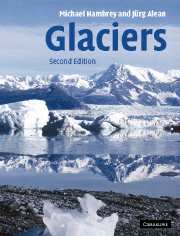Book contents
- Frontmatter
- Contents
- Preface
- Acknowledgements
- 1 Earth, the icy planet
- 2 The glacier family
- 3 Birth, growth and decay of glaciers
- 4 Fluctuating glaciers
- 5 Ice on the move
- 6 Nature's conveyor belt
- 7 Ice and water
- 8 Antarctica: the icy continent
- 9 Glaciers and volcanoes
- 10 Shaping the landscape
- 11 Glaciers and wildlife
- 12 Benefits of glaciers
- 13 Glacier hazards
- 14 Living and travelling on glaciers
- 15 Earth's glacial record
- 16 Postscript: future prospects of glaciers
- Glossary
- Select bibliography
- Location index
- Subject Index
12 - Benefits of glaciers
Published online by Cambridge University Press: 29 March 2011
- Frontmatter
- Contents
- Preface
- Acknowledgements
- 1 Earth, the icy planet
- 2 The glacier family
- 3 Birth, growth and decay of glaciers
- 4 Fluctuating glaciers
- 5 Ice on the move
- 6 Nature's conveyor belt
- 7 Ice and water
- 8 Antarctica: the icy continent
- 9 Glaciers and volcanoes
- 10 Shaping the landscape
- 11 Glaciers and wildlife
- 12 Benefits of glaciers
- 13 Glacier hazards
- 14 Living and travelling on glaciers
- 15 Earth's glacial record
- 16 Postscript: future prospects of glaciers
- Glossary
- Select bibliography
- Location index
- Subject Index
Summary
To many people, the most obvious benefit of glaciers is their landscape value. This is especially true when visiting glacierized areas such as the Alps or Alaska, or glaciated areas like the Scottish Highlands and Yosemite National Park in California. However, we may also pose some questions concerning the wider importance of glaciers in terms of the benefits they provide for human civilization. For example, we may well ask: ‘How much is a glacier worth?’ ‘Would it matter if most glaciers in temperate latitudes melted away?’ ‘How can glaciers, their meltwaters and depositional products be used for our benefit? ’. Therefore, in this chapter we explore not only the benefits of today's glaciers, but also those that have long since disappeared.
Mark Twain tells a story in the late nineteenth century of how he travelled to Zermatt, took the mountain railway up to Gornergrat, a well-known viewpoint from which tourists can observe the Matterhorn, and then sat down on nearby Gornergletscher. His plan was, at least as far as the story goes, to use the glacier's motion to return to Zermatt, thus saving the return fare on the railway. Perhaps this was one of the first attempts to cite the value of glaciers, albeit in a rather amusing way.
Irrigation and energy supply
A number of the world's desert regions, such as northwestern China, the Thar Desert of north-western India and Pakistan, the coastal desert of Peru or the wine-growing area of Mendoza in Argentina, all receive waters from adjacent, glacierized mountain ranges.
- Type
- Chapter
- Information
- Glaciers , pp. 227 - 240Publisher: Cambridge University PressPrint publication year: 2004



